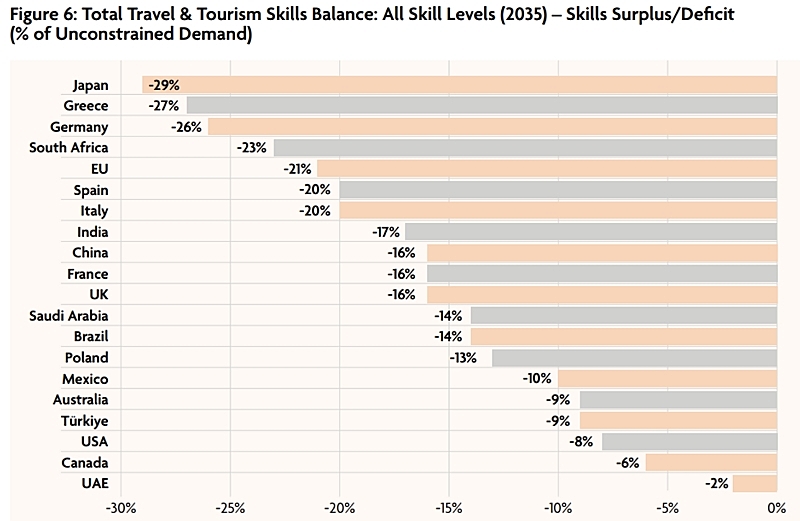
World Travel & Tourism Council (WTTC) released ‘Future of the Travel & Tourism Workforce” at the 25th Global Summit in Rome. The survey, conducted by The Hong Kong Polytechnic University targeting 20 countries, warns that shortage of tourism workforces possibly becomes risks in the tourism industry, while tourism is a power to create jobs worldwide.
91 million new jobs will be created, but 43 million will be short
According to the report, the tourism industry is expected to employ 357 million people globally in 2024, reaching 371 million by 2025. It also predicts that 91 million new jobs will be created over the next decade, accounting for one in three new jobs created worldwide.
Meanwhile, a labor shortage of over 43 million is expected by 2035, meaning that 16% of the required workforces may not be secured. In particular, the hospitality sector is predicted to face a shortage of 8.6 million, or 18%. The report points out that more than 20 million additional workers will be required in customer service and service sectors that are difficult to automate.
By region, the labor shortage numbers are 16.9 million in China, 11 million in India, and 6.4 million in the EU. Relative to demand levels, Japan is most severely affected, with a labor supply shortfall of 29% compared to demand levels in 2035, followed by Greece (27% shortfall) and Germany (26% shortfall).
 WTTC report: Future of the Travel & Tourism Workforce
WTTC report: Future of the Travel & Tourism Workforce
“The entire industry has a responsibility for human resource development”
“The travel and tourism industry remains one of the world's largest job-creating sectors, but faces challenges from demographic and structural changes,” Gloria Guevara, WTTC Interim CEO, said. “About 70 million jobs were lost by the pandemic, and many workers moving to other industries. Despite opportunities to rehire, many workers have not returned. This has left companies struggling to find the right skilled workers.”
In the hospitality sector, there is a significant shortage of specific skilled workers, such as chefs and housekeepers, and restrictions on immigrant labor are becoming increasingly complex. She emphasized the importance of public-private partnerships for human resource development programs.
 Gloria Guevara, WTTC Interim CEO
Gloria Guevara, WTTC Interim CEO
Keys are human resource development and technology investment
Guevara pointed out technology investment in addition to human resource development as keys to overcoming labor shortages, saying that it is necessary for the tourism industry to enhance employee roles while increasing productivity by incorporating AI and new technologies.
“Education is not a one-time experience. It must be provided continuously. WTTC works with universities and vocational schools to create a system that helps young people map out their career paths,” she added.
The report proposes concrete actions to overcome the challenges:
To widely communicate to young people the diverse and attractive career opportunities in the tourism industry.
To strengthen collaboration between educational institutions and industry to develop training that incorporates practical experience.
To retain talents through clear career paths, leadership development, and inclusive workplace culture.
To promote digital literacy, AI adoption, and sustainable practices to prepare for the future and increase productivity.
To implement flexible labor policies, reduce barriers to international recruitment, and introduce mechanisms to convert part-time to full-time positions.
 Travel Voice | Japanese Travel Trade News Japan's No.1
Travel Voice | Japanese Travel Trade News Japan's No.1